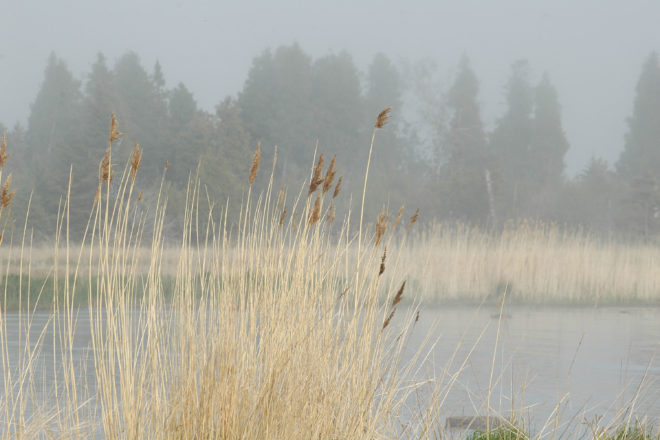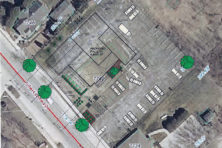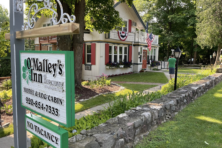Baileys Harbor Considers Workforce Housing Plan, Phragmites Ordinance
- Share
- Tweet
- Pin
- Share

The Baileys Harbor Town Board will seek more information on a workforce housing proposal and an ordinance requiring management of invasive phragmites after making no decisions on the topics at its Aug. 14 meeting.
Krista Lutzke, conservationist with the Door County Soil and Water Conservation Department (SWCD), was joined by Jacksonport Town Chair Randy Halstead in talking to the board about the implementation of a phragmite ordinance, which Jacksonport adopted in November 2014. The ordinance would implement a fine on residents who do not manage phragmites on their property privately.
“It’s probably the best thing we’ve ever done in Jacksonport,” Halstead said. “Right now we’re probably down to three percent of where we started.”
The program has been funded entirely from resident donations.
Phragmites are tall grasses that typically grow on coastlines or in wetlands. Growing large and tall, they block other native species from growing, limiting biodiversity and possibly preventing the use of swimming beaches.
Lutzke said a reduction in funding and grants has left the SWCD with no money to continue eradication of the invasive species, which the county has done since 2012.
“Because the grants are becoming more difficult to obtain, we are now asking the townships pick up where we left off,” said Lutzke.
Since 2012, the cost of management has significantly decreased. Of the $8,000 the SWCD has spent in managing coastline phragmites in the past five years, only $350 was spent to control them in 2015.
Phragmites are best controlled using the application of an aquatic-species-approved herbicide called imazapyr.
“As far as the Town of Baileys Harbor adopting an ordinance like this, the timing would be perfect because treatment has already started on the shoreline,” said Matt Peter, land manager for The Ridges Sanctuary. “The Achilles heel of projects like this are properties that are left untreated and adjacent municipalities that are left untreated.”
Jacksonport, Sevastopol and Liberty Grove have all adopted similar ordinances. Language in the ordinance proposed to the town board included a $50 to $200 fine for failing to manage phragmites on a property. The cost for management would be paid initially by the town and then taxed to the property owner as a special assessment.
Board member Roberta Thelen expressed concern with the punitive language of the ordinance, but town chair Don Sitte said the board will move forward with some kind of invasive ordinance after further research, possibly changing the fine amounts and the number of invasive species listed in the ordinance.
Fish Creek resident Donn Dresselhuys also made a pitch to the town board for use of a three-acre portion of the town’s 40-acre property off Summit Road near the Wastewater Treatment Plant for a workforce housing development. The board met the proposal with mixed opinions but unanimously decided to send the matter to the Plan Commission.
Dresselhuys presented a floor plan of the 1,100-square foot manufactured homes, 10 of which would be put on a three-acre lot.
Under his model, the property would be managed by a property management company, but individual business owners would purchase the homes. Business owners would also be liable for association fees and upkeep of the house itself, while the property manager would be responsible for maintenance such as snow plowing and landscaping outside of the homes. Employee rent would be negotiated privately between the employee and the business owner.
Dresselhuys did not give an estimate of what the homes would cost the business owners, citing uncertainties in construction, but he did calculate the estimated annual cost of things such as association fees.
Under the model, annual costs to a business owner beyond the purchase of the home would be $4,900 for the business owner, but Dresselhuys expects productivity increases by having more reliable employee living conditions would offset these expenses. The homes would also be winterized, allowing for additional revenue in the offseason, which was not calculated into his cost analysis.
The Plan Commission will discuss the proposal further at its September meeting.


